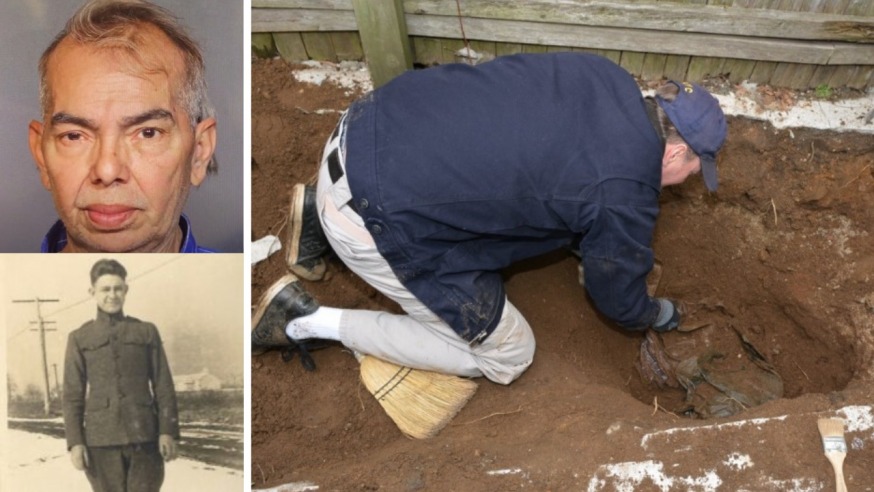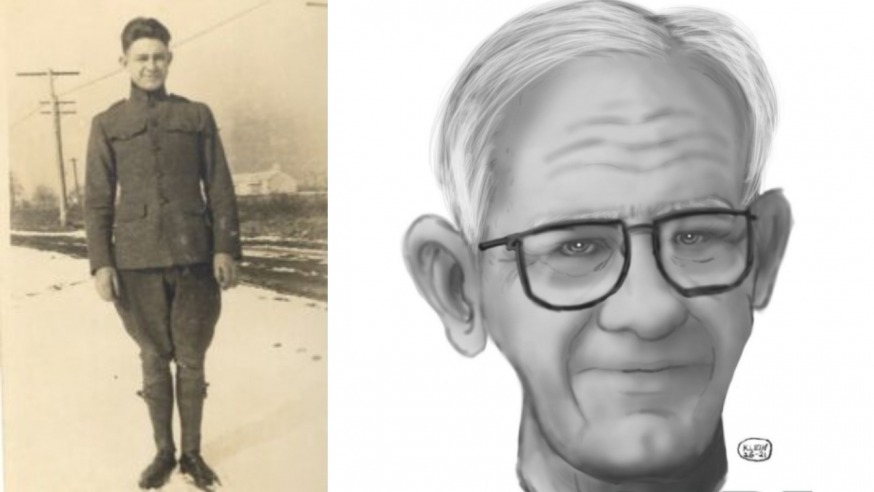
Martin Motta, top left, was sentenced to 20 years in prison Monday for the 1976 killing of World War I veteran George Clarence Seitz, bottom left, in a decades-old cold case. Investigators digging up Seitz’s remains in 2019, right (Photo: Screenshot and Queens DA)
Nov. 7, 2022 By Michael Dorgan
A Queens man was sentenced to 20 years in prison Monday for the 1976 killing of a World War I veteran — in a decades-old cold case that was solved using forensic genetic genealogy for the first time in New York City.
Martin Motta, 75, of Jamaica, pleaded guilty to manslaughter in the first degree last month and was sentenced at Queens Supreme Court today for killing 81-year-old George Clarence Seitz — whose dismembered body was discovered buried in the backyard of a Richmond Hill home in 2019.
Motta, according to the Queens District Attorney’s Office, admitted to fatally stabbing Seitz in the head after robbing him of approximately $7,000 to $8,000 nearly 46 years ago.
He then dismembered Seitz’s body at the neck, shoulders and hips — before burying it beneath concrete slabs to the rear of the 115th Street house. Motta was 29 at the time of the killing.
Seitz’s remains — a pelvis and partial torso — were found in March 2019 after police received a phone call from an individual who said he had details about a homicide the year of Seitz’s disappearance, investigators said previously. Police believe threats of intimidation may have prevented the caller from coming forward sooner.
Seitz had been last seen leaving his home in Jamaica to get a haircut at a barbershop where Motta worked on Dec. 10, 1976, and was reported missing five days later, according to reports.
Police said previously that Motto’s motive was to rob Seitz, who had been known to carry large sums of cash.

WWI veteran George Clarence Seitz, pictured left. A police sketch of Seitz, pictured right (Photos: Queen’s District Attorney’s Office (L) and NYPD (R))
After finding body parts at the Richmond Hill home, investigators were unable to identify the remains for roughly two years.
Authorities failed to get a DNA match after searching local, state and national databases. The Queens DA and the NYPD then sought the help of the FBI and a private laboratory.
The private lab, Othram Laboratories, used advanced DNA technologies including forensic genetic genealogy to produce a genealogical profile from the skeletal remains. The technology helps to connect the deceased—such as people whose bodies have not been identified–with their family members.
The profile was handed off to the FBI, which found leads for the Queens DA and the NYPD to investigate.
Investigators contacted potential family members of the victim and obtained DNA samples to compare to the remains. Through their efforts, they confirmed the body belonged to Seitz.
Once Seitz was identified, Motta was identified as a suspect during a subsequent investigation that involved multiple witness interviews and extensive record searches.
The investigation, which was led by the NYPD and DA’s Office, then found “crucial evidence” that linked Motta to the murder.
“After 46 years, a veteran of the First World War gets justice,” Queens District Attorney Melinda Katz said. “The successes of modern technology and forensics made it possible for us to… identify the bones of the victim.”
Katz said she established the Cold Case Unit shortly after becoming the Queens District Attorney in an effort to try and solve cases where time appeared to have run out.
“Time allowed forensic genetic genealogy and our investigators to catch up to this defendant.”
